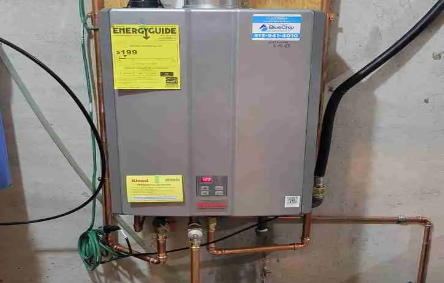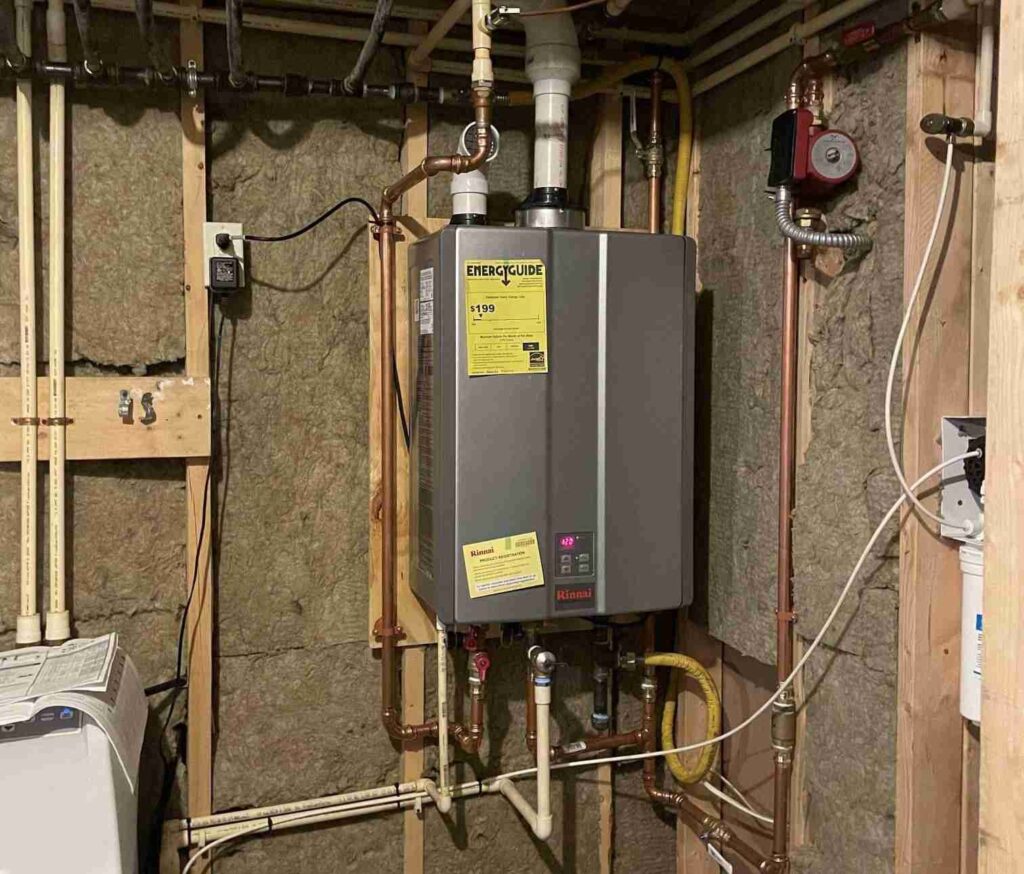
Learn about the benefits of an endless supply of hot water.
We’ve all been there. You’re in the middle of a hot shower when suddenly, the nice, even flow of hot water turns cold and you’re left with a tough decision to make – either turn off the shower or quickly rinse off in the cold. If running out of hot water is an ongoing issue in your home, a tankless water heater could be the right choice to ensure a consistent flow of hot water in your future.
First, let’s understand how a tankless hot water heater works and how it is different from a traditional water heater.
A tankless system heats up cold water on-demand as it travels through the unit and is dispersed in the home. It does not have a storage “tank” like a traditional hot water heater, which stores between 20-80 gallons of water (depending on its size) in a tank that is heated at all times by either electric or gas. Keeping 20-80 gallons of water consistently heated requires more energy and is therefore more costly for homeowners. A tankless system also requires less space since it is typically attached to the wall.
What are the benefits to installing a tankless water heater?
Deciding to replace a traditional hot water heater with a tankless system can be the right choice for many households. Here are a few benefits to installing a new system in your home:
Endless supply of hot water: having an on-demand water heater means you will always have an ample supply of hot water at your fingertips. Which means, no more cold showers!
- Cost savings: tankless water heaters are on average 24% to 34% more energy-efficient than traditional water heaters. This can mean an accumulation of big savings for households over time.
- Longer lifespan: on average tankless water heaters last 20+ years. While traditional water heaters only last 10-15 years before they must be replaced.
- Save space: since tankless water heaters do not have a large 20-80 gallon storage tank, the required space for the system is much less. Most tankless water heaters can be installed on the wall in various places in the home, which also frees up floor space.
- Tax credit: homeowners can take advantage of the 25C tax credit for gas tankless water heaters that are installed before the year 2032. The tax credit allows for a maximum claim of 30% on the cost of an approved Energy Star system. This can mean up to $600 in tax credits for homeowners.

What is the downside?
While tankless water heaters supply hot water on-demand, their capabilities can be limited if multiple sources in the home are pulling hot water at the same time. For example, if the shower is running while the dishwasher and washing machine are also running, the water temperature coming from the tankless unit may fluctuate since it can only heat so much water at a time. This can be remedied by installing more than one tankless water heater.
What is required for the installation of a new tankless water heater?
While a new tankless water heater can be a DIY project for homeowners, we strongly recommend hiring a licensed professional to install the new tankless water heater to ensure safety and accuracy. Here are a few things that homeowners should know about the process:
Local building codes should be confirmed to determine where the tankless water heater can be installed in the home. It is possible that the new unit will be installed in a separate area than the current traditional water heater.
- Avoid installing the tankless water heater in areas where freezing temperatures are possible, and areas that could expose the unit to splashing water, humidity and moisture.
- If the water heater source is gas, the tankless water heater will require the installation of an exhaust vent that flows directly to the outside through a PVC pipe.
- Homeowners should also verify if the current gas line is sufficient for the new tankless system. Since tankless gas water heaters require a larger gas supply line than traditional water heaters, it is possible that an upgraded gas line will be required.
- The old water heater will need to be completely drained and removed from the home before or after the new tankless system is installed.
What are the maintenance requirements on a tankless water heater?
Tankless water heaters can be a great choice for many homeowners, but like other systems in the home, maintenance is needed to ensure that your new tankless water heater continues to run in the most efficient way. A common issue found in tankless water heaters is buildup of sediment from minerals in the water supply. Scheduling your tankless water heater for annual service can help prevent damage from sediment buildup. Here are a few things that homeowners can also do to keep their system in tip-top shape:
Periodic cleaning and inspection of the exhaust vent.
- Keep the area around the exhaust vent free of snow and ice.
- Periodic cleaning of the inlet water filter.
- Periodic cleaning and inspection of the air filter.
Is a tankless hot water heater right for you?
If you currently have a traditional water heater and running out of hot water is an ongoing issue, switching to a tankless water heater might be the best option for your household. While it is true that a tankless system is more expensive to install than a traditional system, the energy efficiency and longevity of the system will make up for the additional cost over time.
Blue Chip Plumbing can help you decide if a tankless water heater is the right option for you and your family. Contact us here or give us a call today at (513) 999-6820 to speak to a plumbing specialist and get a free quote on installing a new system today.

